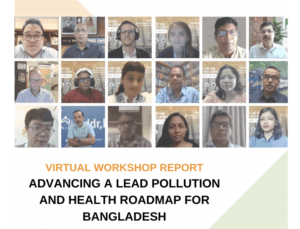
“From today, I declare that I am taking cognizance of this issue and we shall frame projects so that we can drive the eradication of lead exposures as soon as possible.” — Ahmed Shamim Al Razi, Ministry of Environment, Forest and Climate Change, Bangladesh.
This is the kind of commitment that the people of Bangladesh, the 4th most lead impacted country of the world, needed to hear from the Additional Secretary, Ahmed Shamim Al Razi, Ministry of Environment, Forest and Climate Change.
Pure Earth Bangladesh ignited this response and initiated this timely and important discussion by hosting a national-level virtual workshop: ‘Advancing a lead pollution and health roadmap for Bangladesh.’
This event was able to bring all the top-level representatives from government agencies, national and international civil society organizations, research and academic institutions, development agencies, and media under one roof to share the state of knowledge about lead exposure from all sources in Bangladesh, build a common understanding of the related challenges, and lay the groundwork for a unified approach to lead exposure reduction.
The speakers and participants of the event shared many recommendations to improve the lead pollution situation, with a particular emphasis on establishing a multi-stakeholder approach with the leadership of the relevant government ministries to eradicate community lead exposure. Participants also discussed preparing comprehensive lead pollution studies, developing a national inventory on lead pollution sources, and importantly, a time-bound national action plan.
They suggested ensuring improved occupational health safety in lead-related industries, identifying community areas that are contaminated with lead and taking steps to restore these communities, increasing the monitoring capacity of the Department of Environment and the Ministry of Industry, addressing the import of lead chromate as a pigment, and ensuring effective industrial waste management.
The State of the Lead Problem in Bangladesh
The chief concern of lead exposure is its impact on children’s brains. Lead causes permanent brain damage and IQ loss, and as a result, decreases economic productivity. Productivity losses from lead exposure reduce Bangladesh’s GDP by about 16B USD (1.3T Taka) annually, thus lead is not only a health issue but a poverty-reduction issue.
Lead pollution also undermines many cross-cutting development areas, including education, societal stability and violence. It is imperative to understand the sources of lead and why Bangladesh is among the most highly exposed countries to bring change to this situation.
Despite the severe impacts of lead on public health, economic development, and the environment, few programs and policies exist to adequately control contemporary lead sources, reduce exposures, and identify and treat lead-poisoned children. There is also a lack of communication and coordination among stakeholders and no unified plan at the national level.
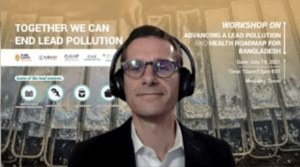
Andrew McCartor, Vice President of Strategy and Partnerships, Pure Earth, drew attention to this situation while setting the background of the event.
“There is room for more coordination and communication between the government, the NGOs, universities, UN groups, the donors, and various stakeholders to striving common goals and strategies. Until now, the projects have been somewhat intermittent and siloed,” he explained. “There is a very strong justification for further work on lead in Bangladesh.”
Main Sources of Lead
Pure Earth has documented over 300 lead-contaminated sites in Bangladesh, where World Bank estimates there are 1100 informal used lead-acid battery (ULAB) recycling sites. Environment and Social Development Organization (ESDO), a partner organization of Pure Earth Bangladesh, estimates over 2000.
While there are some discussions and recognition of informal ULAB recycling as a contamination source, hardly any attention is paid to lead in consumer products. Dr. Shahriar Hossain, an ecologist and the General Secretary of ESDO shared that recent studies have found lead in food (rice, vegetables, and liquid milk). Gold ash processing is another recently-discovered source of lead exposure in Bangladesh.
Dr. Hossain confirmed that suspected lead sources in Bangladesh are ULAB manufacturing and recycling, spices (turmeric), lead-based paint, aluminium cookware, e-waste, contaminated food, jewellery making, cosmetics, religious powders, and traditional medicines. He also highlighted additional sources of lead including pesticide use, industrial waste (including ULAB), shipbreaking, and turmeric processing.
Emphasizing the need for effective guidelines and regulations to monitor this situation, Dr. Hossain said, “There are a growing number of relevant rules and regulations (e-waste, updated SRO on LABs 2021, household paint standard 2018), but enforcement is a problem. Inspectors, officials, and stakeholders need to be aware of the sources and impacts of lead.”
Public Health Crisis
Speakers at the workshop emphasized that lead poisoning in Bangladesh should be viewed as a public health crisis. Given this situation, there are not enough initiatives, investments, resources and capacity to mitigate this crisis.
There is currently no routine blood lead level (BLL) testing in Bangladesh,
but research efforts indicate that children in Bangladesh are among the most highly exposed to lead globally; about 36 million children in the country have elevated blood lead levels.
All BLL data is currently conducted by development partners or research institutions. The government has not yet generated evidence on the current situation.
“A recent systematic review in 2021 estimates the mean BLL in Bangladesh is 7.87 μg/dL. Research has also indicated seven districts as lead hotspots –Dhaka, Gazipur, Tangail, Bogura, Mymensingh, Khulna, and Magura,” noted Dr. Anwar Sadat, Deputy Program Manager, Planning, Monitoring and Research (PMR), Directorate General of Health Services (DGHS).
“We have to establish blood level monitoring and integrate blood lead data into MOH’s routine health information system, such as DHIS2 (District Health Information Software database.) This requires investment to bring the equipment needed to conduct the testing at district or division levels,” he said.
UNICEF, DGHS, and Pure Earth are collaborating and working to mainstream lead poisoning issues in the health sector.
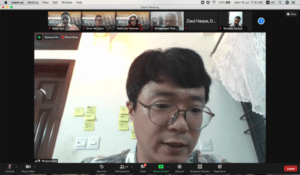
“With this collaboration from other sectors, UNICEF wants to support the Ministry of Health to develop a higher strategy note on environmental health, with focus on lead poisoning, so that no one is left behind for development,” added Dr. Minjoon Kim, Health Specialist, Health section, UNICEF.
Mr. McCartor from Pure Earth, then discussed the health roadmap for Bangladesh and recommended the possible next steps to be taken in terms of both short term and long-term management of ULABs, other lead-related industries, consumer products, and the health sector.
He focused on the establishment of a multi-sectoral stakeholder engagement group, review and assessment of current environmental performance standards, identification of current needs for training or technical assistance around the environmentally sound management of ULAB, development of a national inventory, and overall monitoring, assessment, evaluation, and enforcement of regulatory measures.
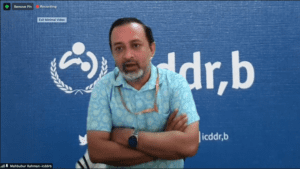
The event was also engaging with an active question and answer and open discussion round with the participants.
During the discussion, Dr. Mahbub, International Centre for Diarrhoeal Disease Research, Bangladesh (icddr,b) shared that the Ministry of Industry and Ministry of Commerce should monitor the import of lead chromate as a pigment so that misuse of the compound (as an additive in turmeric) does not happen.
He also said that the informal ULAB recycling industry is growing and sustaining in Bangladesh because of the current cost-benefit scenario. Industry wants the government to subsidize the formal recycling of ULAB. Currently, the formal sector is mostly only refining, while the informal sector is doing most of the recycling.
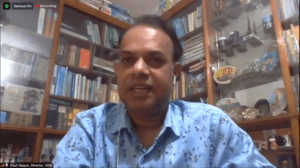
Md. Zia-ul Haque, Director, Dhaka Region, Department of Environment said, “We need to develop a national inventory on lead pollution sources. At the same time, we should prepare a comprehensive lead pollution abatement study and a time-bound action plan with a specific goal to achieve.”
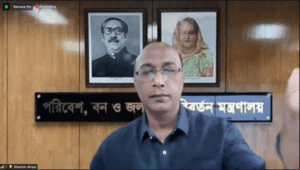
After an interactive session between the host and the respected guests that helped to clarify and solidify the immediate steps to be taken in formulating a wholistic approach, the chief guest in attendance, Mr. Shamim Al-Razi Ahmed, Additional Secretary, Ministry of Environment, Forest and Climate Change, praised this initiative and emphasized the need for a combined effort in the reduction of lead pollution in Bangladesh.
He recommended that instead of unofficially handling the lead acid battery recycling process, it should be brought to the registered or institutional zone, and the institutional process should be monitored to ensure that it can work to protect the environment to the highest standard.
He also recommended that the Department of Environment take the lead in the eradication of lead pollution in the country. According to Mr. Shamim Al-Razi, “Just as the government has imposed taxes and fines to prevent damage to surface and groundwater quality due to removal of untreated waste by industrial units of various factories, similarly cross-contamination by lead pollution through lead must be strictly monitored, law enforcement must be enforced and fines must be imposed.”
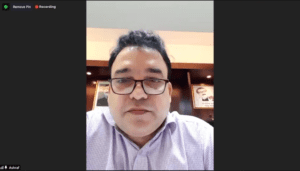
Mr. Asrafuddin, Director General, Department of Environment, the chair of the event, in his concluding remarks talked about the recent developments made by the Government of Bangladesh in preventing lead pollution. He spoke about the shutdown of 14 unauthorized battery manufacturing factories by mobile courts in areas adjacent to Dhaka.
According to Mr.Asrafuddin, “We need to raise public awareness about how lead is increasing our environmental and health risks through industry pollution in our communities, in spices and other foods, and through other products like cosmetics. Lead is a silent killer. Its damage to human body and environment is irreparable.”
He further expressed, “The recommendations and solutions that have emerged from today’s discussion to prevent lead pollution led us to do more research in this area in the future and will play a helpful role in carrying out the effective initiatives.”
“We need to work together to solve this global problem. Pure Earth opened that door to take unified actions,” he added.
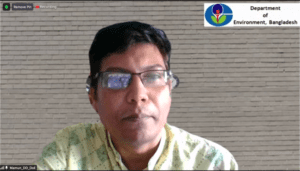
In closing remarks, Dr. Abdullah Al-Mamun, Chemical and Waste Management Unit, Department of Environment, requested cooperation and support from all the key stakeholders, to successfully execute a strategy that ensures complete eradication of lead exposure and lead-related pollution and health issues. He concluded by requesting Pure Earth and other organizations in attendance to come up with options of alternative livelihood and proper rehabilitation of workers in lead-related industries in Bangladesh.
—
Pure Earth Bangladesh hosted the workshop in coordination with the Bangladesh Department of Environment, and with support from the United States Agency for International Development (under Cooperative Agreement No. AID-OAAA-16-00019), OAK Foundation, Swiss Agency for Development and Corporation, and the Global Alliance on Health and Pollution. Pure Earth Bangladesh’s work is possible thanks to the generous support of the Clarios Foundation.
Read a detailed report on the workshop here.
This post is from Mitali Das, Communications Lead, Pure Earth Bangladesh.





